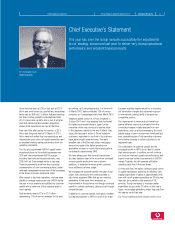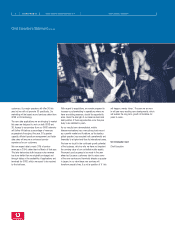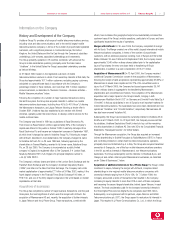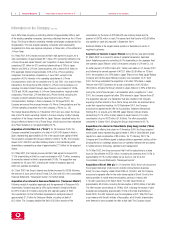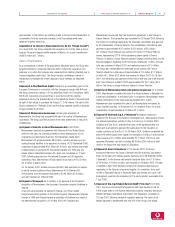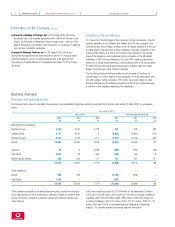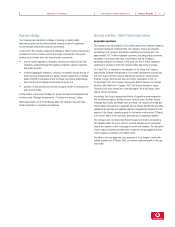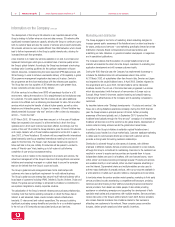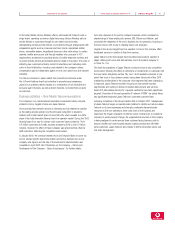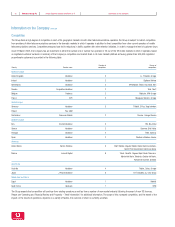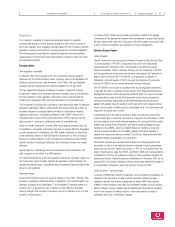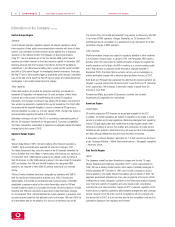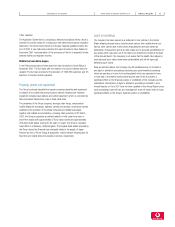Vodafone 2002 Annual Report Download - page 17
Download and view the complete annual report
Please find page 17 of the 2002 Vodafone annual report below. You can navigate through the pages in the report by either clicking on the pages listed below, or by using the keyword search tool below to find specific information within the annual report.
Information on the Company Vodafone Group Plc 15Annual Report & Accounts and Form 20-F
services using a mobile handset, multimedia messaging and the facility to
download data at high speeds.
Following the successful acquisition of a twenty year 3G licence in Germany, the
3G network infrastructure rollout is proceeding according to plan. During the
2002 financial year, Vodafone Germany successfully completed voice and data
trials on its pilot 3G networks and, subject to handset availability, the network is
expected to be open for service by the end of 2002.
During the 2002 financial year, Vodafone AG entered into a domination and profit
and loss transfer agreement with Vodafone Deutschland GmbH, a wholly owned
subsidiary of the Company, under which Vodafone AG would relinquish overall
management of the company to Vodafone Deutschland GmbH and would agree
to transfer its entire profits to Vodafone Deutschland GmbH. The agreement was
approved by Vodafone AG’s supervisory board in June 2001 and, in August
2001, was approved by the Vodafone AG annual general meeting.
On 22 April 2002, the Company announced that Vodafone Deutschland GmbH
intends to buy out the outstanding minority shareholders in Vodafone AG. Further
details on this transaction can be found in note 35 to the Consolidated Financial
Statements, “Subsequent events”.
Switzerland
The Group has a 25% interest in Swisscom Mobile, the largest mobile
telecommunications company in the 72% penetrated Swiss market in terms of
registered customers. At 31 March 2002, Swisscom Mobile had 3,428,000
registered customers, compared with 3,314,000 customers at 31 March 2001.
At 31 March 2002, contract customers represented 64% of the total registered
customer base.
Southern Europe
The Group’s interests in Southern Europe comprise subsidiary undertakings in
Italy, Albania, Greece, Malta, Portugal and Spain, and an associated undertaking
in Romania. The Group’s subsidiaries in Greece and Portugal, are also listed on
public stock exchanges.
Below is a summary of the Group’s business activities in its major mobile
telecommunications markets in Southern Europe.
Italy
The Group has an effective ownership interest of 76.6% in Omnitel Pronto Italia
S.p.A., the second largest of four operators in Italy, and operates under the brand
name Omnitel Vodafone. It had a market share of approximately 34% at 31
March 2002, on the basis of registered customers.
The four operator Italian market is characterised by a high level of prepaid
product and, at over 90%, one of the highest penetration rates in any country in
the world. Omnitel Vodafone’s registered customer base grew by 13% in the year
and was 17,711,000 at 31 March 2002, of which 91% was on prepaid tariffs.
At 31 March 2002, 93% of the registered customer base was active.
Omnitel Vodafone’s network consists of 131 MSCs and 8,141 base stations,
giving population coverage of 99%. During the 2002 financial year Omnitel
Vodafone launched its GPRS service in both the corporate and consumer
markets. The services were initially provided free of charge, with services
charged for from June 2001 for corporate customers and February 2002 for
other consumers. Planned future GPRS developments include mobile office
applications and PDA compatible applications for corporate customers, as well as
multimedia messaging services and Java services for other consumers.
Following an auction, five operators were licenced for fifteen years to offer third
generation mobile services in November 2000. Plans for 3G services remain on
schedule. The deployment of the UMTS network has been performed according
to the defined targets set for the twelve major Italian cities by the end of 2002.
UMTS trial networks have been installed in Turin and Naples and commercial
launch is still expected by the end of 2002. A trial launch is expected in October
2002 when network infrastructure, billing, provisioning, customer care and
support systems will be fully operational and in a state of commercial readiness
to offer 3G service capability, as well as product and service continuity between
GPRS and 3G systems.
Greece
The Group has a 51.9% interest in Vodafone-Panafon Hellenic
Telecommunications Company S.A. (“Vodafone-Panafon”) (which operates as
Vodafone in Greece), the second largest cellular operator in Greece in terms of
number of customers. It is listed on the Athens Stock Exchange and its shares
also trade in the form of Global Depositary Shares on the London Stock
Exchange and are quoted on NASDAQ. At 31 March 2002, it had a market
capitalisation of £1.9 billion ($2.7 billion).
On 11 May 2001, Vodafone-Panafon increased its shareholding in Unifon SA,
one of its service providers, from 19.6% to 100%. The acquisition was funded
through the issue of 21,626,396 new Vodafone-Panafon shares, as a result of
which the Group’s ownership interest in Vodafone-Panafon was reduced from
55% to 52.8%. Subsequent to this, Vodafone-Panafon also acquired NextNet,
another service provider, for shares, resulting in a further dilution of the Group’s
interest to 51.9%.
As a result of the above acquisitions, at 31 March 2002, Vodafone-Panafon
owns an extensive distribution network of retail outlets which now service 86%
of its registered customer base.
Vodafone-Panafon increased its registered customer base by 27% during the
year to 31 March 2002, to close at 2,966,000 of which 72% were connected
to prepaid services.
GPRS service was launched on its network in April 2001, with service now
available for both retail and corporate customers. In July 2001, Vodafone-Panafon
was awarded one of three 3G licences for a fee of approximately 1176 million.
In addition, it acquired extra 2G spectrum, which will allow Vodafone-Panafon
to continue to improve the quality of service for its customers.
Portugal
The Group has a 50.9% shareholding in Vodafone Telecel-Communicacoes
Pessoais S.A., (which operates as Vodafone in Portugal), which is listed on the
Lisbon and Oporto Stock Exchanges. At 31 March 2002, it had a market
capitalisation of approximately £1.1 billion ($1.6 billion).


